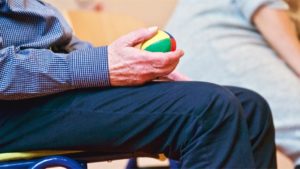
When the weather gets cooler, it’s easy to find excuses to stay inside. All of a sudden, the blustery wind, icy sidewalks, and contagious illnesses make not venturing outside much more appealing, particularly for seniors. But, as a result, physical activity decreases, especially with age.
Staying active as a senior in winter can be a challenge, but consistent, year-round exercise can not only boost their physical well being, but mental health as well. Despite the challenges of exercising during the winter, its benefits are vital to maintaining overall senior well-being.
Maintained Fitness
Keeping a healthy level of fitness is a common (and smart) goal for seniors. As metabolisms slow down with age, maintaining an active lifestyle can help keep a healthy weight and ward off heart disease, high blood pressure, cancer, and other chronic conditions that seniors are most at risk for. Regular exercise can also help in boosting immunity, feeling younger and keeping seniors independent longer thanks to increased functional strength. But, these benefits only happen when the exercise is maintained year-round. If seniors allow their physical fitness to fall off in the wintertime and they become sedentary, their heart health and fitness levels will likely decline. Therefore, it’s critical that they maintain a fitness routine in every season.
Staying Mentally Healthy
Mental health and disease prevention are equally important aspects of a senior’s wellness. Yet, the short days and cold weather can negatively impact senior mental health. One common mental health struggle this time of year is SAD, or seasonal affective disorder– commonly referred to as seasonal depression. SAD plagues its victims during late fall when the weather starts to worsen and the days shorten, and manifests itself in a number of symptoms including:
- Anxiety
- Loneliness
- Mood swings
- Sadness
- Fatigue
- Appetite changes
Because SAD is often caused by lowered levels of socialization and outdoor activity in the winter, seniors are often most at risk of developing it. Experts suggest combating the seasonal disease by maintaining a healthy, active lifestyle. Physical exercise for as little as 30 minutes a day, five days a week can help seniors make strides in improving their cardiovascular health. Exercise can also protect against Alzheimer’s by reducing a senior’s risk by up to 50%, and ward off Dementia.
Getting Outside
Seniors are the population that spends the most time indoors during bad weather. While people naturally absorb vitamin D through the sun, the winter months’ shortened days and cold outdoor temperatures may make it a bit tougher to catch some rays. However, this may cause a Vitamin D deficiency which can, in turn, lead to several health issues in older populations. Be on the lookout for signs of hair loss and bone loss, as both can be side effects of low vitamin D levels. Take them as signs that’s it’s time to get outside, enjoy some sunlight and stay healthy during the winter.
If, despite spending time outside, they still experience the effects of vitamin D deficiency, seniors can supplement their workouts with aids to improve symptoms. To ward off the effects of hair thinning or bone loss, seniors should include a hair loss treatment and calcium supplement in their daily routine. This, paired with regular exercise in the sun, should help seniors maintain a well-rounded health routine in the winter.
How Seniors Can Get Active in the Winter
This certainly doesn’t mean that seniors should be hitting the slopes or running marathons in difficult, wintry conditions. There are plenty of low impact activities for seniors to perform indoors or outdoors that promote a healthy lifestyle:
- Walking
- Jogging
- Dancing
- Swimming
- Yoga
As mentioned above, the cooler, darker and shorter days of winter can be a challenge to stay motivated to live an active lifestyle. While the ease of staying in is tempting, the tremendous upside of staying active and moving can improve health in seniors in a physical, mental, and social way!